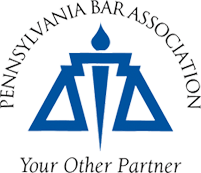HARRISBURG (Oct. 2, 2012) - Applications are being accepted until Dec. 1 from lawyers interested in participating in the first round of testing for the "Workers' Compensation Law Specialty Certification." The first certification exam is scheduled to be given in March 2013, with an exact date, time and location to be announced.
Earlier this year, the Pennsylvania Supreme Court approved a recommendation of the Pennsylvania Bar Association (PBA) Review and Certifying Board to grant accreditation to the PBA Workers' Compensation Law Section as a certifying organization in the area of workers' compensation law. With the Supreme Court's order, the PBA Workers' Compensation Law Section became the first bar association entity in Pennsylvania to receive approval as a certifying organization.
Certified applicants will be permitted to use the following language when communicating their certifications to the public: "Certified as a specialist in the practice of workers' compensation law by the Pennsylvania Bar Association's Section on Workers' Compensation Law as authorized by the Pennsylvania Supreme Court."
"This new opportunity to become certified in the area of workers' compensation is beneficial for experienced lawyers in the field and their clients," said Thomas G. Wilkinson Jr., president, Pennsylvania Bar Association. "Certification is going to give those in need of legal services in the workers' compensation field valuable guidance when seeking counsel, and it's going to offer legal practitioners the ability to highlight their knowledge and expertise."
The certification exam will focus on familiar portions of workers' compensation law and rules, as well as leading case law, said John Bagnato of Johnstown, chair of the 12-member Certification Committee that is overseeing creation and implementation of the certification program. The exam will include 100 multiple-choice questions (each worth one point) and two essays (each worth 10 points) that must be completed within four hours. Passage of the exam requires a score of at least 90 points. A score of 90 on the multiple-choice portion of the exam results in automatic passage of the exam and the essays will not be graded.
"The application process to take the exam makes it clear from the outset that the certification is for those lawyers who have expertise in the worker's compensation field," said Bagnato. "To pass muster to qualify for the exam, an applicant must establish by documentation that he or she is admitted to practice in Pennsylvania, is actively engaged in the practice of law for a minimum of five years and devotes a minimum of 50 percent of his or her practice to the specialty field of workers' compensation."
Bagnato said the applicant also must submit a variety of documents showing active practice in the workers' compensation law field and participation in Mandatory Continuing Legal Education in workers' compensation law.
Applications are available on the Pennsylvania Bar Association website (www.pabar.org). An application fee of $325 is due when the application is submitted. Completed applications and application fees should be mailed to the following address: Pennsylvania Bar Association, Attn: Workers' Compensation Certification Application, P.O. Box 186, Harrisburg, PA 17108. Requests for additional information should be directed to the PBA's Susan Etter at 800-932-0311, ext. 2256 and [email protected].
After the application is processed and verified, there is an exam fee of $150.
It's anticipated that the exam will be given at least once per year, and examination questions will be revised annually to incorporate new developments and eliminate repetitive questions.
A lawyer successfully completing the exam will be certified for five years. There will be a $165 annual fee to maintain certification in years two, three, four and five of the certification period. Six months prior to the expiration of the five-year certification, the lawyer will complete another certification application and pay a $325 fee, but the lawyer will not be required to take the exam.
The Certification Committee has the authority to revoke certification under certain circumstances, and the committee has an appeal process for such cases.
Founded in 1895, the Pennsylvania Bar Association strives to promote justice, professional excellence and respect for the law; improve public understanding of the legal system; facilitate access to legal services; and serve the 28,000 lawyers who are members of the association.
| 